

Driving Team Effectiveness. 40% Of Your Team's Effort Is Wasted. These 4 Methods Get Results: Teamwork funny. Teamwork- very funny video. Effective Team Work & Collaboration. Teamwork. Assessment | Biopsychology | Comparative | Cognitive | Developmental | Language | Individual differences | Personality | Philosophy | Social |Methods | Statistics | Clinical | Educational | Industrial | Professional items | World psychology | Industrial & Organisational : Introduction : Personnel : Organizational psychology : Occupations: Work environment: Index : Outline Projects often require that people work together to accomplish a common goal; therefore, teamwork is an important factor in most organizations.
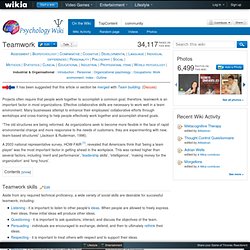
Effective collaborative skills are necessary to work well in a team environment. Many businesses attempt to enhance their employees' collaborative efforts through workshops and cross-training to help people effectively work together and accomplish shared goals. Effective Team Work & Collaboration. Six Common Misperceptions about Teamwork - J. Richard Hackman. By J.
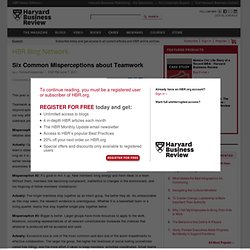
Richard Hackman | 5:50 PM June 7, 2011 This post is part of the HBR Insight Center Making Collaboration Work. Teamwork and collaboration are critical to mission achievement in any organization that has to respond quickly to changing circumstances. My research in the U.S. intelligence community has not only affirmed that idea but also surfaced a number of mistaken beliefs about teamwork that can sidetrack productive collaboration. Here are six of them. Attributes of a high-performing team. How do you know you are building a good team?
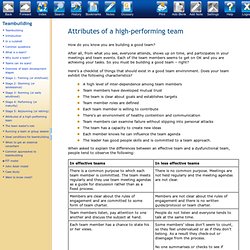
After all, from what you see, everyone attends, shows up on time, and participates in your meetings and team events. Each of the team members seems to get on OK and you are achieving your tasks. So you must be building a good team – right? Moving From Me To We.com. The Clear Path to Great Teamwork. 15 Quotes to Inspire Great Teamwork. The difference between success and failure is a great team.
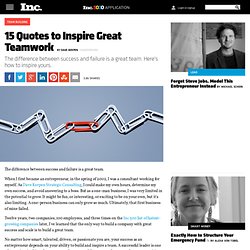
When I first became an entrepreneur, in the spring of 2002, I was a consultant working for myself. As Dave Kerpen Strategic Consulting, I could make my own hours, determine my own success, and avoid answering to a boss. But as a one-man business, I was very limited in the potential to grow. It might be fun, or interesting, or exciting to be on your own, but it's also limiting. A one-person business can only grow so much. Twelve years, two companies, 100 employees, and three times on the Inc 500 list of fastest-growing companies later, I've learned that the only way to build a company with great success and scale is to build a great team.
Group cohesiveness. When discussing social groups, a group is said to be in a state of cohesion when its members possess bonds linking them to one another and to the group as a whole.

Although cohesion is a multi-faceted process, it can be broken down into four main components: social relations, task relations, perceived unity, and emotions.[1] Members of strongly cohesive groups are more inclined to participate readily and to stay with the group.[2] Definition[edit] Why Teamwork is Overrated. Does teamwork always enhance the performance of organisations?
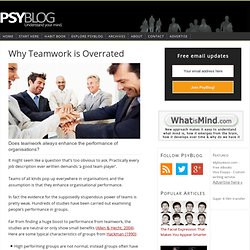
It might seem like a question that’s too obvious to ask. Practically every job description ever written demands ‘a good team player’. Teams of all kinds pop up everywhere in organisations and the assumption is that they enhance organisational performance. In fact the evidence for the supposedly stupendous power of teams is pretty weak. Hundreds of studies have been carried out examining people’s performance in groups.
Far from finding a huge boost to performance from teamwork, the studies are neutral or only show small benefits (Allen & Hecht, 2004). High performing groups are not normal, instead groups often have huge variations in ability from top to bottom.People in groups often waste time squabbling over goals.Groups frequently suffer downward performance spirals. The message from the research is clear: the benefits of teamwork are nowhere near as clear as the fashion would suggest. Image credit: Thomas Cunningham. Teamwork exercise. The Three Pillars of High Performance Teams. The Top 10 Performance Factors for Teams.
Image source by Vojko Kalan Memo to the new team, 2/23/13: Raise your hand if you love wasting time on: Meaningless drivel.Frustrating stagnation.Superficial relationships.Worthless discussions.Trivial decisions.Mediocre results.Mundane impact.
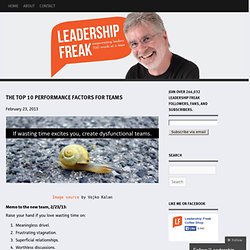
7 Characteristics of Effective Teamwork. The Key Habit Of Highly Effective Teams. In Silicon Valley, where I work, teams are obsessed with crossing the divide between having great dreams and actually achieving them.
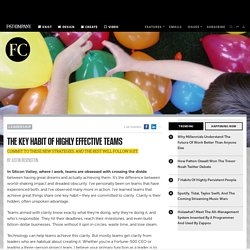
It’s the difference between world-shaking impact and dreaded obscurity. I’ve personally been on teams that have experienced both, and I’ve observed many more in action. Just read this: Healthy Teams in 10 Easy Phrases « Random Thoughts from an Online Pastor. Three Qualities Every Leader Needs to Succeed on a Team - Peter Bregman. “I want your help developing my direct reports into stronger leaders,” John* the new CEO of Fasseni, a $350 million technology company, told me several years ago.
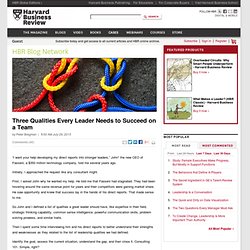
Initially, I approached the request like any consultant might. First, I asked John why he wanted my help. He told me that Fasseni had stagnated. They had been hovering around the same revenue point for years and their competitors were gaining market share. Positive Teams Are More Productive. All managers would like their teams to be more productive.

Yet most companies are using the same old methods: strategic plans, goal-setting, streamlining operations, reducing inefficiency. Others are offering employee perks, such as on-site food, daycare, or gyms. Others are offering bigger bonuses or flexible schedules. Kim Cameron and his colleagues at the University of Michigan, however, have discovered a way to improve performance that has nothing to do with dishing out benefits or deploying new processes. Teamwork Drives Performance Model. Why Some Teams Are Smarter Than Others. Individual intelligence, as psychologists measure it, is defined by its generality: People with good vocabularies, for instance, also tend to have good math skills, even though we often think of those abilities as distinct. The results of our studies showed that this same kind of general intelligence also exists for teams.
On average, the groups that did well on one task did well on the others, too. In other words, some teams were simply smarter than others. We next tried to define what characteristics distinguished the smarter teams from the rest, and we were a bit surprised by the answers we got. Insight Center: The Secrets of Great Teams - Sponsored by SAS. Group Development. Using the Class Group Groups take time to develop. How long, of course, is impossible to specify. It depends on size, frequency of interaction, structural features, and so on. However, one of the best-known bits of literature on groups is Tuckman's model of group development, based on a meta-analysis of the complex models which had previously been developed. It has the virtue of being memorable, but the limitation of being rather rigid. Forming: in which the group is just coming together. Storming: in which, having been established, there is a period of jockeying for position, authority and influence among the members.
Norming: having sorted out its internal structure, there is then the issue of what the group stands for. Performing: after all that, the group can begin to get some work done, on the basis of a relatively stable structure. The diagram is non-standard in that it shows this process not as a linear sequence, but as a cycle, after the initial forming.
Tuckman Team Development Model. Forming, Storming, Norming and Performing - Leadership skills from MindTools. Understanding the Stages of Team Formation Learn how to use Bruce Tuckman's simple model to help your new team become effective quickly. You can't expect a new team to perform well when it first comes together. Forming a team takes time, and members often go through recognizable stages as they change from being collections of strangers to united groups with common goals. Tuckman; Forming - Storming - Norming - Perfoming. This model was first developed by Bruce Tuckman in 1965. It is one of the more known team development theories and has formed the basis of many further ideas since its conception. Tuckman's theory focuses on the way in which a team tackles a task from the initial formation of the team through to the completion of the project.
Tuckman later added a fifth phase; Adjourning and Transforming to cover the finishing of a task. Tuckman's theory is particularly relevant to team building challenges as the phases pertain to the completion of any task undertaken by a team. One of the very useful aspects of team building activities contained within a short period of time is that teams have an opportunity to observe their behaviour within a measurable time frame. Four (Five) Stages of Team Development - Bruce Tuckman. Team Developmental Maturity and Situational Leadership Model. Edison Team Extended Performance Model. Team Performance Maturity Model.
Drexler/Sibbet Team Performance Model. Drexler - Sibbet Team Performance Model. Allan Drexler and David Sibbet have refined a comprehensive model of team performance, (Drexler/Sibbet Team Performance™ Model), that shows the predictable stages involved in both creating and sustaining teams. They say that team development has seven stages, four to create the team and three to describe levels of performance. The stages are: 5 Steps for Building a Great Startup Team.